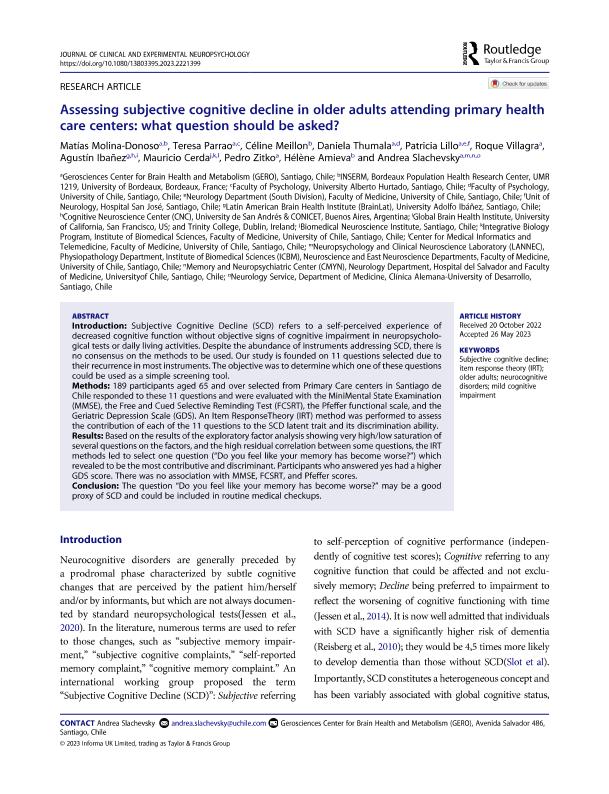Artículo
Assessing subjective cognitive decline in older adults attending primary health care centers: what question should be asked?
Molina Donoso, Matías; Parrao, Teresa; Meillon, Céline; Thumala, Daniela; Lillo, Patricia; Villagra, Roque; Ibanez Barassi, Agustin Mariano ; Cerda, Mauricio; Zitko, Pedro; Amieva, Hélène; Slachevsky, Andrea
; Cerda, Mauricio; Zitko, Pedro; Amieva, Hélène; Slachevsky, Andrea
 ; Cerda, Mauricio; Zitko, Pedro; Amieva, Hélène; Slachevsky, Andrea
; Cerda, Mauricio; Zitko, Pedro; Amieva, Hélène; Slachevsky, Andrea
Fecha de publicación:
07/2023
Editorial:
Taylor & Francis
Revista:
Journal of Clinical and Experimental Neuropsychology
ISSN:
1380-3395
Idioma:
Inglés
Tipo de recurso:
Artículo publicado
Clasificación temática:
Resumen
Introduction: Subjective Cognitive Decline (SCD) refers to a self-perceived experience of decreased cognitive function without objective signs of cognitive impairment in neuropsychological tests or daily living activities. Despite the abundance of instruments addressing SCD, there is no consensus on the methods to be used. Our study is founded on 11 questions selected due to their recurrence in most instruments. The objective was to determine which one of these questions could be used as a simple screening tool. Methods: 189 participants aged 65 and over selected from Primary Care centers in Santiago de Chile responded to these 11 questions and were evaluated with the MiniMental State Examination (MMSE), the Free and Cued Selective Reminding Test (FCSRT), the Pfeffer functional scale, and the Geriatric Depression Scale (GDS). An Item ResponseTheory (IRT) method was performed to assess the contribution of each of the 11 questions to the SCD latent trait and its discrimination ability. Results: Based on the results of the exploratory factor analysis showing very high/low saturation of several questions on the factors, and the high residual correlation between some questions, the IRT methods led to select one question (“Do you feel like your memory has become worse?”) which revealed to be the most contributive and discriminant. Participants who answered yes had a higher GDS score. There was no association with MMSE, FCSRT, and Pfeffer scores. Conclusion: The question “Do you feel like your memory has become worse?” may be a good proxy of SCD and could be included in routine medical checkups.
Archivos asociados
Licencia
Identificadores
Colecciones
Articulos(SEDE CENTRAL)
Articulos de SEDE CENTRAL
Articulos de SEDE CENTRAL
Citación
Molina Donoso, Matías; Parrao, Teresa; Meillon, Céline; Thumala, Daniela; Lillo, Patricia; et al.; Assessing subjective cognitive decline in older adults attending primary health care centers: what question should be asked?; Taylor & Francis; Journal of Clinical and Experimental Neuropsychology; 45; 3; 7-2023; 313-320
Compartir
Altmétricas



